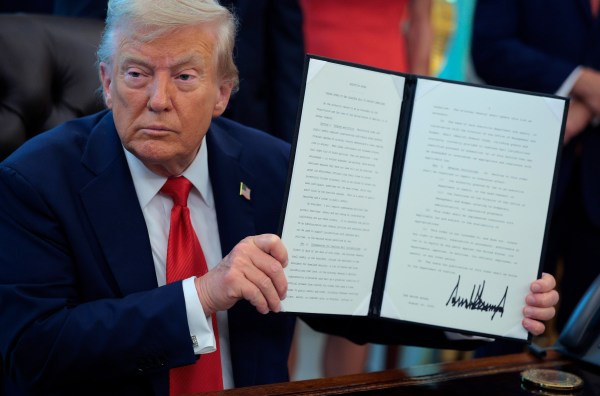In 628 editions of this newsletter, here’s a sentence you haven’t read until now: Populists are irritated at Donald Trump.
They’re not irritated at him for his trade-war fiasco or for being a socialist or for wanting to send U.S. citizens to foreign gulags. They’re not irritated that he turned over America’s public health to someone who isn’t sure whether it’s healthier to contract measles than to be immunized. They’re not irritated that he’s wrecked longstanding alliances and poisoned opinion about the United States by trash-talking friendly nations and sporadically musing about annexing them. And they’re not irritated that he’s presently engaged in the most corrupt scam in the history of the presidency.
They’re irritated at him over a plane.
The royal family of Qatar reportedly wants to give the president—excuse me, I mean the Defense Department—a “flying palace” jumbo jet that’s decked out with all, and I do mean all, the trimmings. That jet will be put into service as Air Force One, according to ABC News, and “will then be transferred to the Trump Presidential Library Foundation no later than Jan. 1, 2029.” White House and Justice Department lawyers looked at the deal and concluded that it’s all on the up-and-up legally. Apparently former Qatar lobbyist turned Attorney General Pam Bondi personally signed the memo permitting acceptance of the gift.
Asked about it on Monday, the president seemed earnestly puzzled by the public uproar. "I would never be one to turn down that kind of an offer,” he admitted to reporters. “I mean, I could be a stupid person and say, 'No, we don't want a free, very expensive airplane.'” That must be the first time that an American politician has answered an allegation of bribery by pointing out just how stupendously fat the fat envelope he was handed is.
I admit, though, I’m puzzled too.
A surprising backlash.
Being mad at the president for corruption in 2025 is like being mad at him for imposing tariffs. Unless you spent the last 10 years in a coma, what did you expect? You knew damn well he was a snake before you took him in.
This is an administration that’s not only perfecting traditional forms of bribery, it has developed cutting-edge ways to monetize the presidency, including by involving novel technologies. The Trump kids are on a sort of world tour as I write this, aimed at cashing in on their father’s power with dad set to benefit personally from some of the deals they’ve struck—one of which involves Qatar. The White House is so hostile to ethical oversight of itself and its political allies that one of the first tasks it assigned Bondi after she became AG was to cripple anti-corruption units at the DOJ.
The president is famously “transactional,” a euphemism for the fact that there are no morals or principles that restrain his self-interest; he proved in his first term that he’s willing to leverage his office for quid pro quos that benefit him personally; and he has a natural affinity for leaders like Vladimir Putin and Nayib Bukele who enjoy impunity within the authoritarian political cultures they’ve created. He wants America to function like a banana republic, and in a banana republic there’s nothing wrong with the caudillo accepting a bribe. Even when (especially when?) that bribe happens to have wings.
So why are people, including some well-known MAGA “influencers” who’ve defended him remorselessly for years, suddenly ticked off about the plane?
“At this point it's pretty clear that Trump and his followers actually enjoy breaking through legal, moral, and ethical barriers,” David French wrote after news of the Qatari “gift” broke. “They love watching people get angry about it. It's a game to them.”
That’s how the White House expected the usual suspects to react, no doubt. But that’s not what it got.
Professing her willingness to “take a bullet” for the president, Laura Loomer nonetheless urged him to refuse the plane and called it a “stain” on his administration if he accepted it. “Ditto,” said radio host Mark Levin. Batya Ungar-Sargon, who has parlayed her “MAGA leftist” politics into media ubiquity, appeared on Newsmax to condemn the transaction as stomach-turning and correctly pronounced it a bribe, not a “gift.”
Most notably, Ben Shapiro told the millions who listen to his podcast that “this kind of skeezy stuff needs to stop” and admonished them that “I think if we switch the names to Hunter Biden and Joe Biden, we'd all be freaking out on the right.” He even delved into Trump’s ludicrous memecoin graft, a subject populist media types typically avoid lest they anger their fans by speaking critically of the leader.
In short, the plane has touched off a backlash even among people whose livelihoods depend on making ever more creative excuses for the president’s lousiness. Why?
Elephants in the room.
Maybe it’s as simple as the optics being unusually terrible. The memecoin scam can be spun or overlooked because most Americans don’t know what a “memecoin” is, but a president receiving a $400 million plane from a foreign government is so ethically shady that even a child could grasp the problem. It’s a political elephant in the room that happens to be the size of several elephants. It can’t be gate-kept as easily as many Trump scandals can and it can’t be defended on the merits. Not without embarrassing oneself, anyway.
Perhaps Shapiro et al. concluded there was no choice on this one but to take the L, particularly given the amazing hypocrisy of Trump urging Americans to learn to live with less while he’s busily outfitting his airborne “palace.”
Or maybe it’s the audacity of his lawbreaking that stunned them. Article I, Section 9 of the Constitution reads: “No Person holding any Office of Profit or Trust under [the United States], shall, without the Consent of the Congress, accept of any present … from any King, Prince, or foreign State.” That explains why the Qatari bribe is being structured as a gift to the Defense Department and eventually to Trump’s presidential library rather than to the president himself. So long as Trump doesn’t personally own the plane, it’s technically not a “present” to him. Good enough for Pam Bondi’s DOJ!
Not good enough for anyone with an ounce of intelligence or scruples, though. “It is ridiculous. It’s a gift to Trump. The federal government is a pass-through,” one government ethics expert told CNN. The president claimed yesterday that he won’t have use of the aircraft after he leaves office, that it’ll be decommissioned and housed at his presidential library just as Ronald Reagan’s presidential plane was, but he’ll certainly reverse himself on that in time. And if it’s true, it’s nonsensical: Reagan’s plane was decommissioned after 28 years in service whereas the Qatari plane is just 13 years old. If it’s a gift to the Defense Department rather than to Trump specifically, why shouldn’t future presidents continue to use it for the next decade or two?
Or here’s a third theory: It’s not illegality or bad optics that have offended populist influencers, it’s the outlandish stupidity of accepting a glaring security risk by letting the president of the United States fly around on a plane supplied by another country.
Trump and his defenders are touting the Qatari jet as the solution to a not-very-bothersome problem, the fact that Boeing is over budget and behind schedule in supplying the U.S. government with updated versions of Air Force One. Not until 2027 at the earliest will those planes be ready; instead of learning to live with less by sticking with his current aircraft for two more years, the president wants something new and exciting now. But you can’t just take any ol’ jumbo jet, slap some paint on the fuselage, and hand it over to the White House. The presidential jet is a special piece of equipment.
“This is a flying nuclear-hardened command post,” as a former U.S. official described Air Force One to the Washington Post. “It has to have secure capability at multiple levels.” Experts told the paper that it would cost billions of dollars and require years of work (so much for a “free” plane) to retrofit the Qatari jet with the technology needed to let the president do his job safely while in the air, a task that wouldn’t be finished until Trump has left office. And because no one trusts the Qataris not to have bugged the craft, technicians would need to inspect its components inch by inch looking for surveillance devices. “You’d pretty much have to take that plane down to the skeleton and put it back together,” one retired Secret Service agent told the Post.
It’s a “security nightmare.” Either Trump will agree to let the plane be fully and properly retrofitted, which means the Boeing aircraft will likely be ready for him before his Qatari “palace” is, or he’ll foolishly waive some of the security measures with which Air Force One is supposed to be equipped in order to put it into service sooner. Which would mean he’d be flying around in a plane that the whole world knows isn’t as well-defended as it’s supposed to be.
Which of those three theories best explains why populists like Shapiro are annoyed at Qatar’s bribe?
None of them do.
The briber, not the bribe.
I don’t think populists care a lick in the abstract about the president accepting a bribe, even when its value runs well into nine figures and he’s doing it in broad daylight.
Ethics is more of a classical-liberal preoccupation because classical liberalism concerns itself with process. Bribe-taking is bad regardless of who’s doing it because it gives wealthy, corrupt interests outsized influence over policy relative to the people. Even if you’re sympathetic in a given case to the briber and the bribed, you should condemn bribery in order to maintain the taboo against a practice that will grossly distort the incentives in policymaking if normalized.
Postliberals like Trump and his fans don’t care about process, they care about outcomes. Who, whom?, as the Bolshevists liked to say: Whether a bribe should or shouldn’t be overlooked depends on whom it serves politically. Joe Biden being bribed by George Soros to push a progressive agenda is an outrage. Donald Trump being bribed by Elon Musk to push an authoritarian one is a necessary evil to make America great.
I think Trump’s “gift” from Qatar has a who, whom? problem with the right.
If you read Shapiro’s monologue about the jet, you’ll find it relatively light on civic outrage about Trump’s bribe-taking (he does allow that it’s “inherently” bad) and heavy on anxiety about how scandal might undermine the Republican agenda. “If you want President Trump to succeed, this kind of skeezy stuff needs to stop,” he warned listeners. “If you want President Trump's agenda to succeed, taking jets from Qatar is not the way…. I promise you, I promise you, if these issues begin to dog his administration, Republicans will lose Congress. It's that simple.”
That’s a textbook postliberal argument against bribery. The bad outcome to be avoided isn’t the president being bought and sold, it’s postliberals potentially losing power in government due to a public backlash driven by the president being bought and sold. Theoretically, if you could guarantee Shapiro that voters won’t hold the jet against Trump and the GOP at the polls, he’d be more or less fine with it.
And I don’t think that they will hold it against him. Americans in 2025 have the political attention span of goldfish, especially with new distractions arriving from the White House each hour. The plane will be shrugged off or forgotten soon enough and Ben Shapiro is smart enough to know it. What’s really irritating him is the who, whom? problem—namely that the bribe in this case serves the interests of Qatar, and Qatar is a poisonous influence.
That’s the common thread among all of the populist commentary I’ve seen criticizing Trump for accepting the jet, in fact. “Taking sacks of goodies from people who support Hamas, Muslim Brotherhood, al-Jazeera, all the rest, that's not America first,” Shapiro told listeners, ticking through some of Qatar’s foreign policy lowlights. “Jihadists in suits,” Loomer called them. “Qatar must stop buying our colleges and universities and spreading their anti-American, Jew-hating propaganda and funding terrorist groups and front groups,” Levin declared. “It's turning my stomach that Qatar, a state sponsor of terror, has become a major player on the global stage,” Ungar-Sargon added.
It’s not the bribe that’s troublesome, it’s the fact that it came from the Qataris.
Triangulation.
The remarkable subtext in all of that populist criticism, I think, is their fear that the bribe might work. There’s no indignation on Trump’s behalf among them at the idea that something as paltry as a free plane might shake his commitment to Israel and lead him to reorient U.S. policy in the Middle East toward Hamas’ patrons in Doha. Rather, they seem tacitly alarmed that it might.
And they should be.
Most Americans may not have noticed, but U.S. relations with Israel have taken a turn lately. The president vetoed an Israeli attack on Iran’s nuclear program and is working on a deal with Tehran that could preserve that country’s ability to enrich uranium in some form. He negotiated an end to American airstrikes on Yemen, but didn’t demand as a condition that the Houthis there refrain from further attacks on Israelis. Days ago news leaked that he’s willing to work with the Saudis on civilian nuclear technology without insisting that they first recognize Israel diplomatically, as the Biden administration had done. When Steve Witkoff, his envoy to the Middle East, met recently with the families of hostages being held by Hamas, he reportedly blamed Israel for extending the crisis by insisting on a new incursion in Gaza.
“Many Israelis are wondering whether Israel is the next U.S. ally to be left behind by a president they considered, just months ago, to be the most pro-Israel in history,” the Post reported. One former Netanyahu aide described the mood in Jerusalem over Trump’s shift as “total panic.”
Meanwhile, his relations with the Sunni gulf states are getting warmer. He’s giving them the honor this week of being his first destination abroad since returning to office, visiting Saudi Arabia, the United Arab Emirates, and—where else?—Qatar as part of a mutual charm offensive. The Qataris are greeting him with gifts, and I don’t just mean a fancy shmancy plane: Under pressure from Qatar and Egypt, Hamas released Israeli-American hostage Edan Alexander on Sunday as Trump was kicking off his trip.
What are they expecting from him in return?
We got a clue this morning when the president announced during a speech in Riyadh that he’s lifting U.S. sanctions on Syria ahead of his meeting with the country’s new president, Ahmed al-Sharaa. Al-Sharaa is a supposedly reformed jihadist who led Sunni forces there when they overthrew Bashar al-Assad; Israel is skeptical of him and has encouraged major powers not to recognize his regime too quickly, knowing from hard experience how dangerous it is to have Sunni radicals in charge of territory on their doorstep. But Qatar, like Saudi Arabia, is invested in al-Sharaa—literally, it’s helping to pick up the tab for his fledgling government—and Qatar has growing influence with the president of the United States. So American sanctions are gone, whether Israel likes it or not.
It’s anyone’s guess what the next “ask” from the Qataris will be. Levin wondered recently whether they’ll lobby Trump this week during his visit to formally recognize a Palestinian state in Gaza, making Hamas’ foothold there permanent. Others seem to view Qatar’s bribery as part of a general campaign to shrink support for Israel in the United States by increasing its own country’s influence correspondingly. I tend to think that the Sunni states are hoping to convince the president to view them going forward as allies broadly equal in stature to Israel, if not militarily or technologically then certainly economically, and thus entitled to equal prioritization by Washington.
Succeeding in that effort would help them hedge against the risk of U.S. detente with their Shiite enemies in Iran. And would give the next Sunni outfit to spring an October 7 on Israel, be it from Gaza or from Syria, a bit of leverage in the West Wing. Call it “triangulation” if you like.
That’s what worries the Shapiros of the MAGAsphere about the Qatari “flying palace,” I suspect. It’s not so much that a big gaudy status symbol will cause the president to rethink 75 years of U.S. policy toward the Middle East—although, Trump being Trump, it might!—as that his views about the region may have already begun to shift and his willingness to accept the plane suggests they’ll keep on shifting, perhaps quickly. They voted for a transactionalist with no moral compass and now they’ve got one. They knew he was a snake before they took him in.







Please note that we at The Dispatch hold ourselves, our work, and our commenters to a higher standard than other places on the internet. We welcome comments that foster genuine debate or discussion—including comments critical of us or our work—but responses that include ad hominem attacks on fellow Dispatch members or are intended to stoke fear and anger may be moderated.
With your membership, you only have the ability to comment on The Morning Dispatch articles. Consider upgrading to join the conversation everywhere.